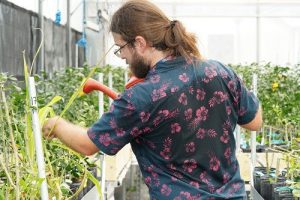Last Updated on January 19, 2022 by Tennille Herron
My name is Taylor Petrusha, and I am a 2021 University of Florida graduate student enrolled in my first semester in the Department of Environmental Horticulture.
During the summer of 2021, I interned at the University of Florida’s Institute of Food and Agricultural Sciences (UF/IFAS) Mid-Florida Research & Education Center (MREC) for an exciting 4-month sponsored research experience. Through this series, I will share my story with you and talk about the benefits of a research internship.
Part 2: Biological Control of Greenhouse Pests
Entomology Professor, Dr. Lance Osborne, along with his Lab Technician Josh Hogan, Biological Scientist Katherine Houben, and Agricultural Assistant Irma Herrera, shared knowledge and expertise of biological control of citrus pests.

Biological control refers to the use of beneficial species to manage pests in an agricultural environment. Florida citrus growers have been using biological control methods, such as fungal biopesticides, to manage anthropod pests since the 1916.
They guided me in proper scouting procedures, and helped me to understand the banker system for biological control of pests. We also received recommendations from Dr. Lauren Diepenbrock, Assistant Professor of Entomology & Extension Specialist from UF/IFAS Citrus Research and Education Center.
Some of the trees showed symptoms of possible disease, and we asked Dr. David Norman, Associate Professor of Plant Pathology at MREC, to help identify the cause and provide some recommendations for treatment.
I also learned that it is very important to understand the balance of beneficial and harmful pests, and when necessary, which chemical pesticides are compatible with beneficial predators.
Stay tuned for the next part in this series which will focus on professional benefits of internships.
 0
0
